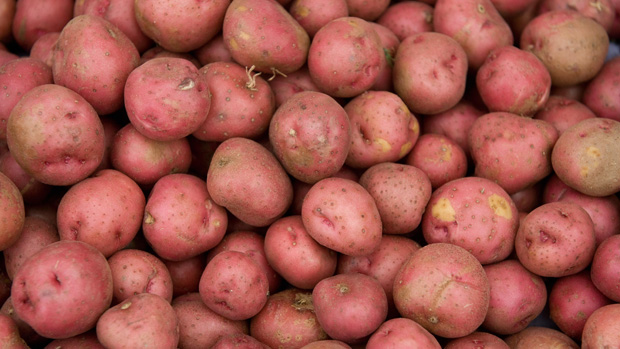Americans get first bite of British GM potato
Blight-resistant GM potato created in Norwich and funded by taxpayers - so why will Americans benefit first?

A free daily email with the biggest news stories of the day – and the best features from TheWeek.com
You are now subscribed
Your newsletter sign-up was successful
BRITISH scientists have developed a strain of genetically modified potato that appears to be completely resistant to the devastating fungus late blight.
During the three-year study, conducted just outside Norwich, researchers added genes from a wild South American variety to Desiree plants, the BBC reports. The results showed that the modified plants were able to fight off the fungus.
Blight-resistant potatoes would reduce pesticide use and save farmers millions of pounds a year, but European regulation and consumer reluctance to eat genetically modified products could prevent their widespread adoption.
The Week
Escape your echo chamber. Get the facts behind the news, plus analysis from multiple perspectives.

Sign up for The Week's Free Newsletters
From our morning news briefing to a weekly Good News Newsletter, get the best of The Week delivered directly to your inbox.
From our morning news briefing to a weekly Good News Newsletter, get the best of The Week delivered directly to your inbox.
What is late blight?
Late blight, or phytophthora infestans, is a devastating disease that affects potatoes and tomatoes. It thrives in damp conditions, producing spores that spread rapidly, and has the potential to destroy entire plantations.
The disease was responsible for starting the Irish Potato famine of the 1840s, which claimed the lives of over 750,000 people.
How could genetic modifications be beneficial?
A free daily email with the biggest news stories of the day – and the best features from TheWeek.com
Currently farmers spray crops between 15 and 25 times a season to protect against blight. The Daily Telegraph reports that growers spend around £60m a year on prevention measures, noting that "during a bad year, losses and control measures combined can account for half the total cost of growing potatoes."
The study's lead scientist, Professor Jonathan Jones of the Sainsbury Laboratory, says genetic modifications are likely to provide the best solution in the long term.
"Breeding from wild relatives is laborious and slow," he says, "and by the time a gene is successfully introduced into a cultivated variety the late blight pathogen may already have evolved the ability to overcome it."
He added: "I think it is better to control disease with genetics than with chemistry."
The opponents
GM Freeze, an organisation that campaigns against genetically modified crops, argues that they are "poorly regulated" and have the "potential to cause massive social, economic and environmental damage worldwide". Its website says that GM in farming raises fundamental health concerns as the effect of GM foods on human health "remains uncertain".
Liz O'Neil, the group's director, says that there is no public appetite for modified food. Experience shows that the UK doesn't want GM in its shopping basket," she said, "and British farmers are far too smart to grow something they can't sell."
What will happen next?
Although the research was funded by European taxpayers, American farmers will be the first to benefit from it – the US company Simplot has been granted a licence to begin trials. Getting regulatory approval to start UK production is likely to be difficult given the "expensive" and "extremely slow" nature of the European regulatory process, according to Professor Chris Pollock, of Aberystwyth University. Professor Jones said: "This kind of product will likely be on the US market within a couple of years and if we are lucky within eight to ten years in Europe."
What will they taste like?
No one knows: scientists involved in the research were not allowed to taste them.